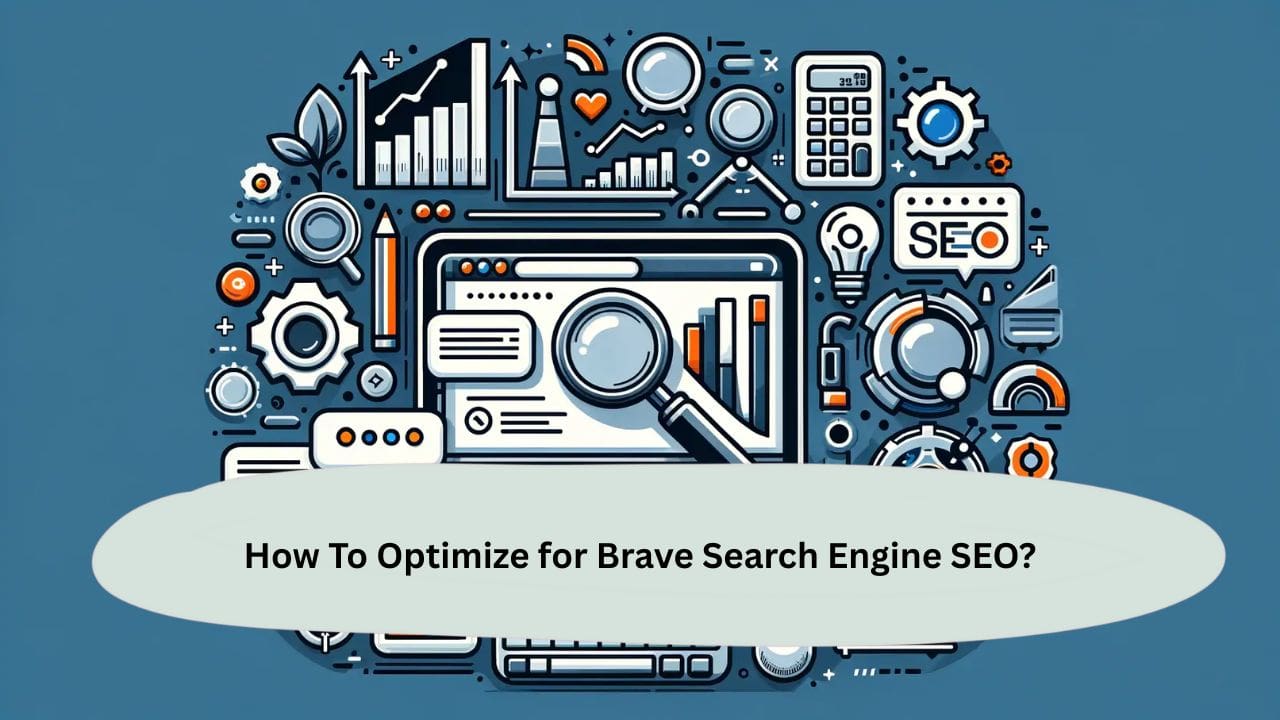I started to optimize my blog for Brave Search by focusing on clean content (and skipping helmets), and within a couple of weeks, I began to see consistent traffic growth. I proved to myself that real, helpful SEO works without big-tech tricks.
How to Optimize for Brave Search Engine SEO? We recommend creating content that respects your users’ privacy (untracked and original) and only includes natural use of keywords, an HTTPS website, and SEO for privacy-conscious users. Brave strongly rewards search engines that prioritize privacy, helpful SEO, and non-ad-driven or manipulative techniques.
In this article How to Optimize for Brave Search Engine SEO?, you’ll discover exactly how to create content, structure your website, and apply smart strategies to start ranking on Brave Search. The best part? It’s all done without spying on your users.
How Do You Create a Keyword Strategy for Brave Search Engine SEO That Works?
While the keyword approach remains important for Brave Search SEO, it is now more focused on natural, intent-driven phrases. Since Brave does not track users, use simple and handy keywords that people type. You can use tools such as Ubersuggest or use Brave’s autosuggest to come up with some long-tail keyword suggestions.
Certainly include the exact keyword, How To Optimize for Brave Search Engine SEO? in your article–and make it a natural use. Place it in your H1 title, in at least one H2 heading, in your meta title, and the first paragraph of your content. You can also use similar terms such as:
- Brave SEO
- Privacy search optimization
- Brave browser SEO tips
- SEO for the Brave search engine
- Independent search engine SEO
How to optimize your website for search engine SEO?

The first step to optimizing your site for SEO is to do keyword research on what your target audience is searching for and use these keywords naturally in the text of your posts and pages, as well as your titles and metadata. Ensure that your site loads fast and is mobile responsive.
Create high-value, original content that solves or answers what the user is searching for. Use internal linking to provide helpful guidelines for your visitors and to help search engines better crawl your pages and links. Use alt text for images and keep your URLs clean and short. Use tools like Google Search Console and Analytics to track your performance and address any issues.
How to optimize the Brave browser?
Clear cache, enable hardware acceleration, use Shields, and disable unnecessary extensions to optimize the Brave browser. Keeping Brave up to date and managing background tabs can also speed up the browser and improve performance.
Clear Cache and Browsing Data
Head to Settings > Privacy and Security > Clear browsing data. Delete all cached files to allow for better speed and performance! This clears slow-loads or glitches.
Enable Hardware Acceleration
Open your Settings menu > System and Toggle Hardware Acceleration ON. This allows Brave to use your GPU and offers quicker browsing and enhanced video playback.
Use Shields Wisely
Brave Shields block ads, trackers, scripts, and use cases. Under the lion icon in the address bar, customize these settings! You can toggle settings per site, which brings a better balance of privacy and functional performance
Turn On Background Tab Throttling
Background tab throttling is a setting that limits resource usage in inactive tabs. Head to brave://flags and search for “Throttle”. This will free up system memory while boosting performance.
Disable Unused Extensions
Extensions can slow down the browser due to resource consumption. Head to brave://extensions/ in your URL bar and disable or remove, degrade the performance of the browser.
Always use the latest Brave Version
Brave regularly updates to patch security vulnerabilities or improve speed. Go to Settings > About Brave and verify you are using the latest version.
How to get 100% SEO?

Getting to 100% SEO means addressing every detail on the technical and content sides of SEO. On-page SEO covers all of the on-page items like titles, meta tags, keywords, images, and internal links. On-page SEO also includes fixing any technical problems, such as broken links, slow load speed, or difficult navigation issues.
Off-page SEO means building backlinks of high quality, and consistent and regularly updated content that is only helpful for users. Structured data is important for indexation, too. Lastly, regular audits of your website and links using SEO software or tools are necessary to identify gaps and areas that need improvement to stay at the top.
What is the Brave Search search engine?
Brave Search is a privately owned search engine produced by the same people who built the Brave browser. It has only one goal: to provide a tracking-free search, without utilizing Google or Bing. Brave Searches utilizes its index, so it delivers totally unbiased results while preserving your privacy.
Some highlighted features of Brave Search include:
- Independent from Google (built from scratch with an independent index)
- No tracking, profiling, or personalized ads
- Provides clean, ad-free results by default
- User privacy takes precedence over data collection
- Fully integrated with the Brave browser that links Search to browsing
What search engine should I use with Brave?

Brave Search is always a great choice for a browser search engine because it’s built into the browser and is 100% independent in its indexing. And, will respect your privacy, probably better than anyone else. DuckDuckGo is another good option for users seeking digital privacy and an ad-free search experience. More generally, neither track private use or your search history beyond the current session.
Brave Search
Brave Search will always be the default and in line with being the most private option because it has independent indexing and does not track users. Not to mention, it fits right in with Brave’s vision of privacy-first.
DuckDuckGo
DuckDuckGo is another strong privacy-focused search engine. For example, DuckDuckGo doesn’t track your searches and provides clean results with promising performance and minimal bias.
Brave SEO Ranking
Brave Search emphasizes three core principles: respect for privacy and transparency, content quality, and delivering valuable content over ads and tracking. To rank well on Brave Search, you need to focus on having a clean, fast, and secure website; original and useful content with no trackers.
As a publisher or brand, you should use structured data on your page and make sure your site is mobile-responsive. Brave Search has its indexing, but backlinks and a friendly design continue to be important in their algorithm. Simply put, if your content is honest and valuable, you will be rewarded.
Brave Search Rerank lets you boost or remove sites from search results

Brave Search Rerank is an innovative feature that empowers users to take charge of their own search experience. Through this feature, you can promote or demote particular websites in your results. This functionality allows you to customize your search experience and reduce unnecessary noise while improving relevance based on your own interests.
Below are some Key Points about Brave Search:
- Privacy-first, as it does not track users or profile them.
- Independent search index that is not based on Big Tech.
- Provides unbiased, ad-free results by default.
- Built directly into the Brave browser.
Brave Search Rerank consists of several features:
- Allows users to boost trustworthy or preferred sites.
- Allows users to remove unwanted or low-quality domains.
- Provides users the ability to control how search results appear.
- Enhances search relevance for an individual and a customizable experience.
SEO Tips for Brave Search?
To improve ranking on Brave Search, write original content that isn’t tracked through tracking scripts and doesn’t spy on users’ usage. Use structured data markup and confirm that your site is HTTPS secured. Optimize for both speed and usability with mobile to improve your visibility and user experience.
Emphasize Original, Quality Content
Brave rewards original, helpful content that answers user intent. You should avoid thin content or duplicate content to increase visibility.
Avoid Heavy Tracking Scripts
Brave prefers sites that are minimal on trackers, or may not use trackers at all. If the page is clean and doesn’t take much time to load, it will do better in Brave.
Use Structured Data Markup
When you mark up content with Schema, Brave can ‘see’ your content even better, creating a better chance of appearing in rich search results.
Secure Your Site with HTTPS
Brave loves secure websites. Using HTTPS can promote trustworthiness and potentially improve your ranking on a privacy-focused web browser.
Optimize for Speed and Mobile
Faster, mobile-friendly sites have a better user experience. Using responsive design and compressed images can help to minimize load times.
FAQs: How To Optimize for Brave Search Engine SEO?
1. Is Brave Search SEO different from Google SEO?
Yes, SEO on Brave Search is more focused on user privacy, clean content, and original indexing (no duplicate content). Unlike Google, Brave Search does not rank results based on behavioral tracking or ads.
2. Does backlinking matter in Brave Search optimization?
Yes, backlinks from trusted sites still help boost your credibility, even on Brave. The quality of content is now a much stronger part of the ranking process than traditional engines, though.
3. How can I track my Brave Search rankings?
At this point. There is no official Brave Search analytics tool. You can track Brave as a traffic source in your analytics. You can also use user feedback sources and site performance metrics to assess your growth.
4. Should I still use keywords for Brave Search SEO?
Yes, of course! Using natural, well-placed keywords helps Brave search understand what your content is. But don’t go crazy and keyword stuff (quality of writing wins).
5. Can structured data improve visibility on Brave Search?
Yes! Utilizing schema or structured data may help Brave understand what type of content it is indexing, which can positively impact how it gets indexed and perhaps presented in featured snippets.
Conclusion: How To Optimize for Brave Search Engine SEO?
If you want more visibility while respecting another audience’s privacy, optimizing your Brave Search Engine SEO is key. Create original, valuable content without any tracking tools. Fast, secure, structured with a schema is what you need. Brave rewards clean, ethical SEO, which is built for users, not advertisers.



